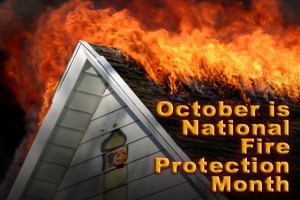How to Protect Your Family and Business by Preventing a Fire
We need to know not only what to do in the event of a fire, but also fire prevention tips to stop a fire before it starts.
Check out these recommendations from the National Fire Protection Association (NFPA). Following these simple fire prevention tips helps to avoid fires and protects lives and property:
1. Stay Alert!
 Stay focused on what you are doing, especially when near heating equipment and fireplaces, and while cooking or smoking.
Stay focused on what you are doing, especially when near heating equipment and fireplaces, and while cooking or smoking.
2. Cook with Care:
Unattended cooking is the leading cause of house fires. The odds of having a cooking fire in your home this year are one in twenty-two. Most cooking fires start at the stovetop. Do not leave the kitchen when cooking on the stovetop. Set a timer to remind you when using the oven. Do not cook or use a stove if you are sleepy or have consumed alcohol. Do not allow flammable materials— paper towels, curtains, oven mitts, wooden utensils, kitchen towels, food packaging— near the stovetop.
3. Keep Extinguishers Handy:
Keep fire extinguishers available for emergencies. Put one extinguisher in the kitchen and at least one more on every floor in the house. Be sure family members know how to use the extinguishers. Check the extinguishers’ gauges regularly. Replace when indicated on the gauge. Use extinguishers only for small emergencies— like a fire in a wastepaper basket— and only AFTER you call 911 or the fire department.
4. Candle with Caution:
Only light candles contained in sturdy candleholders. Keep candles at least a foot or more away from flammable materials and on an uncluttered surface. Refrain from using candles in the bedroom where you are likely to fall asleep. Never burn a candle to the end; throw away stubs. When you leave a room, blow out all burning candles. Instead of candles, keep battery-powered lighting handy for power outages.
5. Heat Safely:
Keep flammable materials away from furnaces, space heaters, and water heaters. Heaters should be a minimum of three feet from any flammable material. Never try to heat your home with the oven. All heating equipment, space heaters, and water heaters should be installed by professionals according to manufacturer’s instructions and all local building codes. Have heating equipment inspected and cleaned annually by professionals. Turn portable heaters off when leaving the room.
6. Fireplace Safety:
As with heating equipment, keep flammable materials away fireplaces. Have chimneys cleaned annually by professionals. Always use a sturdy fireplace screen. Glass fireplace screens cool down slowly, so approach cautiously. Remove wood-burning fireplace ashes only when completely cold, using a metal can. Store ash cans far from the structure.
7. Smoking Dangers:
 Smoking is the number one cause of fire related deaths in the U.S. and Canada. Smoking puts your family at risk— 25% of all smoking-related fatalities are not the smoker. Never smoke when sleepy, drowsy from medication or alcohol, or while in bed. Use heavy, deep ashtrays for extinguishing cigarettes. Dispose of cigarette butts in sand or by dousing with water. Never smoke near oxygen in use.
Smoking is the number one cause of fire related deaths in the U.S. and Canada. Smoking puts your family at risk— 25% of all smoking-related fatalities are not the smoker. Never smoke when sleepy, drowsy from medication or alcohol, or while in bed. Use heavy, deep ashtrays for extinguishing cigarettes. Dispose of cigarette butts in sand or by dousing with water. Never smoke near oxygen in use.
8. Electrical Hazards:
Never plug more than one heat-producing appliance— toaster, toaster oven, coffee maker, space heater, curling iron, blow dryer, etc.— into an outlet at a time. Avoid having too many things plugged into one outlet. Do not use power strips or extension cords for major appliances like refrigerators, freezers, washers, dryers, stoves, heaters, and dishwashers. Have a professional electrician check your breakers to be sure they are safe. Never run electrical cords across doorways, under carpets and rugs, or under drapery. Inspect electrical cords and replace any which show signs of wear. Do not use light bulbs at a higher wattage than recommend for lamps and fixtures.
9. Install Automatic Sprinklers:
Building codes often require sprinkler systems for certain commercial and industrial buildings. Consider adding a sprinkler system to your home for increased fire safety. Sprinkler systems reduce fire damage by an average of 71%— and reduce the chance of fire fatality by 80%. Adding a home sprinkler system costs about the same as replacing carpeting for your home. Adding fire sprinkler systems residential, commercial, and industrial structures generally lowers insurance premiums, too.
10. Remove Rubbish:
Do not allow trash to accumulate in the attic or basement.
Building to Prevent Fires
Think about fire prevention and structural steel fireproofing when choosing a building system for a new residential, commercial, or industrial building.
Wood framing easily becomes the point of ignition in many structural fires. Once a fire starts, wood framing simply provides more fuel to the fire. Wood framing is very likely to burst into flames when struck by lightning.
Pre-engineered, commercial-grade framing never provides an ignition point for fire. Steel never adds fuel to a structural fire. Commercial-grade steel framing will not start to lose its strength until a structural fire reaches 2000°F or more, giving people more chance to escape. It’s durability is only improved with structural steel fireproofing. When properly grounded, lightning-resistant steel buildings are far less likely to ignite or suffer damage when hit by lightning than other building systems.
Insurance companies recognize the fire-resistant capabilities of steel buildings. Most insurers offer big discounts to owners of commercial-grade steel structures.
Make your next residential, commercial, or industrial building project a fire-resistant steel building. Find out why so many people are hooked on RHINO pre-engineered steel buildings and learn about structural steel fireproofing. A RHINO metal building specialist is only a phone call away. Call today for more fire prevention tips and a building quote at this RHINO number: 940.383.9566.
